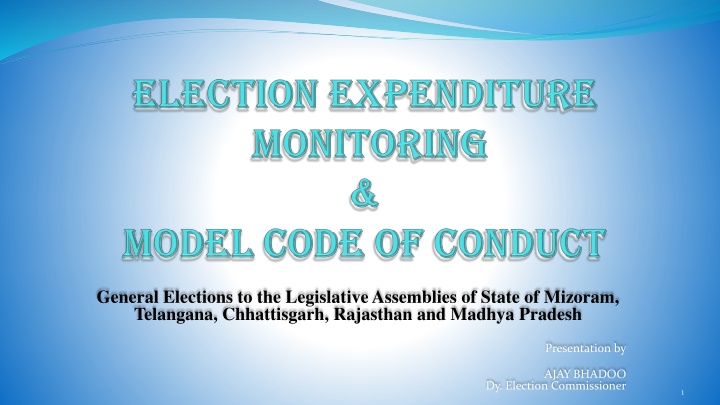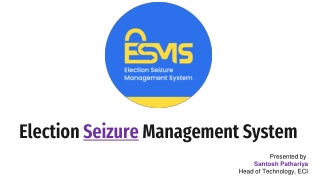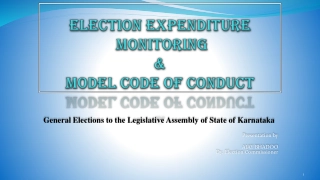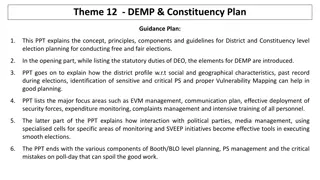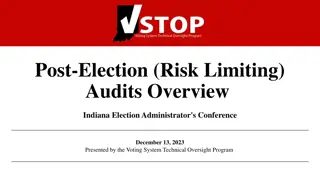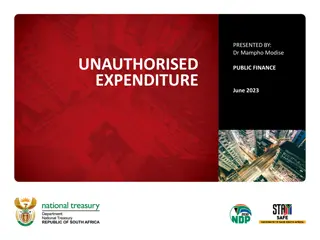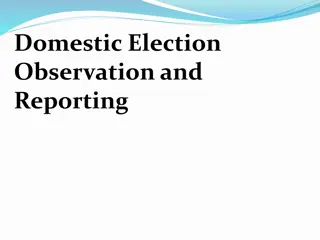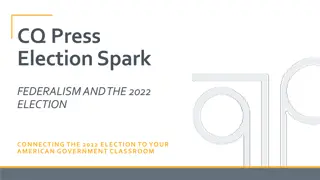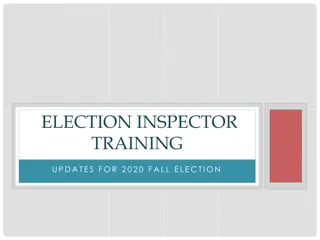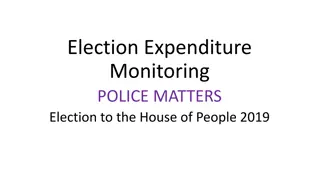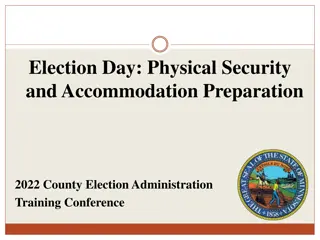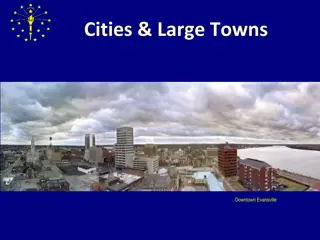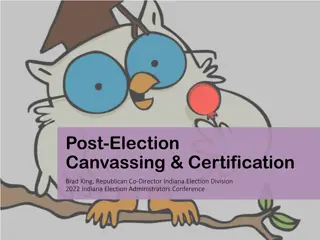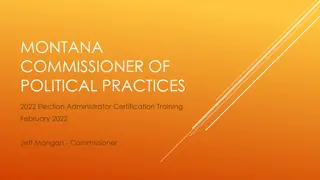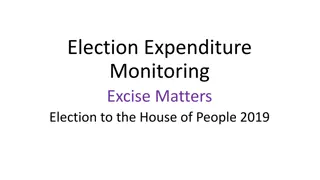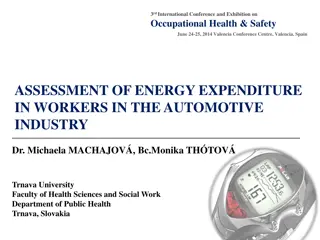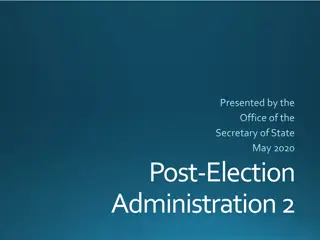Insights on Election Expenditure Monitoring in Indian State Assemblies
This presentation by Ajay Bhadoo, Deputy Election Commissioner, delves into the significance and regulations surrounding election expenditure monitoring in states like Mizoram, Telangana, Chhattisgarh, Rajasthan, and Madhya Pradesh. It covers the impact of money power, legal provisions, types of election expenditure, monitoring machinery, and key aspects for expenditure observers. Details on legal provisions under various acts are also discussed to ensure transparency in election finances.
Download Presentation

Please find below an Image/Link to download the presentation.
The content on the website is provided AS IS for your information and personal use only. It may not be sold, licensed, or shared on other websites without obtaining consent from the author.If you encounter any issues during the download, it is possible that the publisher has removed the file from their server.
You are allowed to download the files provided on this website for personal or commercial use, subject to the condition that they are used lawfully. All files are the property of their respective owners.
The content on the website is provided AS IS for your information and personal use only. It may not be sold, licensed, or shared on other websites without obtaining consent from the author.
E N D
Presentation Transcript
General Elections to the Legislative Assemblies of State of Mizoram, Telangana, Chhattisgarh, Rajasthan and Madhya Pradesh Presentation by AJAY BHADOO Dy. Election Commissioner 1
Part A : Election Expenditure Monitoring 2
Outline of the Presentation Impact of Money Power 1. 2. Objectiveof Election Expenditure Monitoring 3. Legal Provisions 4. Election Expenditure Monitoring Machinery 5. Roleof Expenditure Observer in Election Expenditure Monitoring 6. 3 visits by Expenditure Observerand their role in each visit 7. Focus Areas for Expenditure Observer in Election Expenditure Monitoring 3
Types Of Election Expenditure Election expenditure can be broadly classified into two types Illegal expenditure [Distribution of money, gifts, liquor or any other item to electors and expenditure on Paid News] Legal Expenditure [public meetings, posters, banners, vehicles etc.] Such expenditure should be accounted. Ceiling - Rule 90 of the CE Rules, 1961 Assembly Constituency - 40 lakhs for Chhattisgarh, Telangana, Rajasthan, Madhya Pradesh & 28 lakhs for Mizoram. Such type of expenditure by candidates needs to be stopped 4
Legal Provisions Representation of the People Act, 1951 Conduct of Elections Rules, 1961 Instructions of the ECI Indian Penal Code, 1860 Income Tax Act, 1961 6
PROVISIONS under the RP Act, 1951 Number Campaigners (Sec. 77(2)) of Star Account Expenses and maximum thereof (Sec. 77 (1)) A separate and account of all expenditure. of Election Expenses Campaigners (Sec. 77 (1)) of Star exempt correct election Expenses on account of travel by air or by any other means of transport for propagating programme(s) of the Political Parties shall not be deemed to be election expenditure. For recognized parties- 40 persons. For unrecognized parties - 20 persons. Within a period of 7 days from the notification, names of the Star campaigner communicated to the ECI and CEOs of the States. Between nomination till the date of declaration of results. date of date of to be 7
PROVISIONS under the RP Act, 1951 Disqualification for failure to lodge account of election expense (Sec 10A ) Lodging of Account with District Election (DEO) (Sec 78) Officer Account of candidate to be lodged with DEO within 30 days from declaration of result. Election disqualify a candidate for a period of three years for failure to lodge an account of election expenses within manner required provided the candidate has no good reason or justification for such failure. Commission can the date of time by and law 8
Expenditure Monitoring Machinery Expenditure Observer (EO) Asst. Expenditure Observer (AEO) Flying Squads and Static Surveillance Teams (FS and SST) Video Surveillance Teams (VST) Video Viewing Team (VVT) Accounting Team Excise team Media Certification and Monitoring Committee 9
To do list: First visit of Expenditure Observer Ensure AEOs and monitoring teams are properly trained by DEO and you. Ensure proper preparation and equipping of various expenditure monitoring teams with relevant registers/formats. Conduct a meeting with DEO, SP, District Nodal Officer of Income Tax, State Excise and other District Nodal Officers of enforcementagencies. Ensure that the rate chart is notified by the DEO and is ready to be provided by the RO to prospective contesting candidates, political parties and expenditure monitoring teams. Any objection on rates have to be addressed appropriately by the DEO. 10
To do list: First visit of Expenditure Observer..contd Ensure Expenditure Register is ready for providing to all prospective candidates. Ensure that DEO has held meeting(s) with all political parties and has provided them copies of Expenditure Instructions. Timely filing of Annexure B2 Observer s report No 1 . 11
To do list: Second visit of Expenditure Observer Fixation of dates for inspection of candidates election expenditure register. Obtain daily activity report/feedback from the DM, SP and Income Tax Department, Excise for keeping surveillance on distribution of cash, liquorand othergoods. Ensure that candidates are apprised of the procedure of Expenditure Monitoring by Returning Officerand Expenditure Observer. Ensure Banks are reporting suspicious cash withdrawals to DEOs and it is analysed. Ensure that seizure of cash exceeding 10 lakh is being reported to Income Tax Department by Flying Squad (FS)/Static Surveillance Team (SST)/Police. 12
To do list: Second visit of Expenditure Observercontd.. Ensure that the seized cash/goods are linked to election expenditure. More FSTs and SSTs with CAPF should be placed in Expenditure Sensitive Constituencies, Expenditure Sensitive Pockets along with 24x7 check-posts during the last 72 hours before poll. For Expenditure Sensitive Constituencies (ESCs), more AEOs should be provided. Ensure suspect cases of paid news case are referred to District Level MCMC. Ensure Shadow Observation Register and Folder of Evidence are being properly maintained. Ensure entry of expenditure meetings/rallies/procession in Shadow Observation Register of the candidateconcerned. of all major public 13
To do list: Second visit of Expenditure Observercontd.. Ensure monitoring of liquor production/distribution reports during election period, especially in ESPs. Ensure that all ostentatious expenditure like marriage/group marriage ceremony, are reported to DEO/Income Tax Department. Ensure VST, Accounting Team and Media Monitoring Team are getting copies of permissions granted by concerned authorities for expenses such as vehicles, public meetings, ralliesand processions. Ensure C-Vigil Android App is effective from complaint registration to resolution. Submit Expenditure Observer Report II and III. 14
Inspection Of Accounts Candidates are required to maintain their Day-to-Day accounts and produce them for inspection 3 times before the Expenditure Observer (EO). The RO will notify 3 dates & timing well in advance in consultation with EO forsuch inspection. Gap between the two inspections should not be less than 3 days. A candidate can havea separateagent forelection expenses. 15
To do list: Third visit of Expenditure Observer Attend Account Reconciliation Meeting to be organised by DEO on 26th Day to declaration of election results. Attend District Election Expenditure Monitoring Committee (DEMC) meeting to resolve the issues of account lodged by contesting candidates. Help the DEO in timely preparation of candidate-wise DEO s Scrutiny Reports. Scrutinize DEO s Scrutiny Report and counter-sign at designated place. Submit Expenditure Observer Report IV. 16
Focus areas: 1. Accounting of publicity of criminal antecedents In pursuance of SC Order (reference: WP(C) No.536 of 2011) and press release by Commission dated 11.09.2020, timeline for publicity has been given) -candidates as well as the political parties, regarding candidates nominated by them, will publish the details of criminal antecedents. Publicity- 3 times: Timelines Third publicity: From 9th day till the last day of campaign, i.e. two days before the poll First publicity: Within first 4 days of last date of withdrawal Second publicity: Within 5th to 8th day of last date of withdrawal 17
Focus areas: 2. Visit in ESPs and Monitoring of flow of liquor, drugs, cash Visits to expenditure sensitive pockets and contribute to stepping up of enforcement agencies in such areas. Have route maps of passage of liquor, drugs, cash from the agencies forcloser monitoring. Conduct an analysis of places where high number of seizures of cash/liquor were made in previous two elections, and ensure that special vigil is maintained. Interact with District Excise Authorities regularly for effective action against flow of liquor meant for vitiating electoral process. Ensure close monitoring of sensitive liquor shops as per guidelines in compendium and extant laws. 18
Focus areas: 3. Activities related to Accounts of Candidates Shadow Observation Register to be maintained neatly and cross- referenced with evidence. Issuance of notice on the same day by Returning Officer in cases of discrepancies observed during inspections. Despite notice by the Returning Officer (RO) if the account is not getting inspected then, FIR to be filed by RO. Ensure that there is decent publicity for dates of inspection and the account details are properly displayed. Educate and guide candidates to avoid minor defects like routing the expenses through separate bank account, expenditure over 10,000/- to be incurred through banking channels, vouchers to be signed, etc. 19
Focus areas: 4. Activities related to Proactive engagement with enforcement agencies Ensure proper seamless coordination happens among various agencies including Income Tax, Police, CGST/SGST, State Excise, DRI, NCB, BSF, Railway, Coast Guard, Postal Department, SLBC etc. Ensure quick flow of communication amongst agencies for increased deterrence. Regular follow-ups with district level officers from enforcement agencies. In the constituencies having inter state border, the EOs to also coordinate with border district and agencies. 20
Focus areas: 5. Flying Squads and static surveillance teams 3 or more Flying Squads (FS) and Static Surveillance Teams (SST) in each Assembly Constituency FST-More in Expenditure Sensitive Constituencies (ESCs), if required SST- required at Expenditure Sensitive Pockets (ESPs) Headed by a Magistrate (Adequate numbers/ gazette notification)-To be appointed by the DEO Video Recording- provision of video cameras and trained personnel forrecording. GPS enabled vehicles/ Mobile tracking (C-Vigil App) 21
Seizures in last six general elections (in Crores) States Cash Liquor Narcotics Precious Metals Freebies Total (2022/23) Total (2017) 153.17 84.93 Karnataka 24.03 98.07 24.26 384.46 83.93 Tripura 3.45 3.20 26.82 3.41 8.56 45.43 1.79 Nagaland 6.30 5.09 32.87 0.00 5.76 50.02 4.30 Meghalaya 8.71 2.62 33.25 0.91 28.69 74.18 1.16 Gujarat 31.92 16.40 540.63 36.51 176.39 801.85 27.21 Himachal Pradesh 20.61 19.13 1.23 15.85 0.42 57.24 9.03 22
Seizures in 2022 (in Crores) States Cash Liquor Narcotics Precious Metals Freebie s/Other Items Total (2022) Total (2017) 103.56 62.13 193.29 48.48 40.71 94 348.88 Uttar Pradesh 4.37 4.75 6.85 5.39 4 0.3 18.81 Uttarakhand 6.14 0.73 143.78 6.42 12.17 7.42 170.24 Manipur 33.79 36.79 89.64 376.19 60.54 3.6 510.91 Punjab 6.66 3.57 3.64 1.28 0.02 1.2 12.73 Goa 299.84 154.52 107.97 575.12 117.44 106.52 1061.57 Total 23
Increase in seizures- Analysis Possible becauseof active involvementof enforcementagencies. Possible becauseof proactiveefforts taken by expenditureobservers. Possible because of coordination amongst enforcement agencies where EO has to show leadership. Possible because of proper training, guidance and handholding done byyou. Possible becauseof clues taken outof successful case studies. Possible becauseof momentum provided byyou. 24
Expectations from Expenditure Observers Thorough reading of Expenditure Monitoring Compendium. The roles and duties assigned in each visit to be carried out diligently and pro-actively. Coordination with various enforcement agencies through district level nodal/nodal officers and monitoring them on daily basis. Monitoring the handling of complaints from C-Vigil pertaining to expenditure monitoring. Physical availability and access through mobile phones for citizens and stakeholders. 25
Expectations from Expenditure Observers Proactive reporting of sensitivecases/high end seizures to CEO/Commission. Priorities- Liquor, Drugs, Cash and freebies as inducements meant to vitiate electoral process. Visit to Expenditure Sensitive Pockets and monitor arrangements. 81 ACs have been classified as Expenditure Sensitive Constituencies (ESCs) and needs more monitoring. Enhances monitoring and surprisevigils during last 72 hours before the poll. Catalyse information sharing amongstagencies. Special monitoring to ensure proper checking of passengers and baggage in non- regularairports and helipads. Special monitoring of borderareas as Karnataka has long borders. 26
Part B : Model code Of conduct 27
Model Code of Conduct (For the guidance of political parties & candidates) A set of norms evolved with the consensus of political partiesand enforced by the ECI. Helps ECI toconduct freeand fairelections. Main objective is to provide a level playing field for all partiesand contesting candidatesduring theelections.
Key Provisions Part-I General Conduct: Criticism of political parties must be limited to their policies and programmes, past record and work. Following activities are prohibited: Using caste and communal feelings to secure votes, Criticizing candidates on the basis of unverified reports, Bribing or intimidation of voters, and Organizing demonstrations or picketing outside houses of persons to protestagainst theiropinions. Part-II Meetings: Parties must inform the local police authorities of thevenueand time.
Part-III Processions: If two or more candidates plan processions along the same route, organizers must establish contact in advance to ensure that the processions do not clash. Carrying and burning effigies representing members of otherpolitical parties is notallowed. Part-IV Polling day: All authorized partyworkers at polling booths begiven identity badges. Badge should not contain the party name, symbol or name of the candidate. Part-V Polling Booth: Except the voters, no one to be allowed to enter polling stationwithoutvalid pass/authority letter from ECI. Part-VI Observers: problems regarding theconductof theelection. ECI to appoint observers to address candidate s
Part-VII Party in power: Ministers must not combine official visits with election work or use official machinery for the same. Ruling party must avoid advertising at the cost of the public exchequer Ministers and other authorities must not announce any financial grants, or promise any construction of roads, provision of drinking water, etc. Other parties must be allowed to use public spaces and rest houses and these must not be monopolised by the party in power.
Part-VIII Election manifestos: Promise in election manifestos not a corrupt practice. ECI to ensure level playing field and to see that election process does not getvitiated. Purpose of election manifestos directly associated with election process. Election manifestos shall not contain anything repugnant to ideals and principles of constitution. Manifestos should reflect rationale for the promises and should indicateways and means to meet financial requirement for it.
Enforcement Durationof application- Comes into operation with immediate effect after announcement of election schedule by ECI. Remains enforceable from date of announcement of election till completion of election process. Extent of Application-In case of General election to State Assembly- Entire Stateconcerned Who are Covered- All Organization/ Commissions etc. funded wholly or partially by Central Government/State Government Committees/ Corporation/
Legal status MCC is not enforceable by law. However, certain provisions of the MCC have corresponding provisions in statutes such as IPC 1860, CrPC 1973 and RPA 1951. The following malpractices mentioned in MCC are listed as corrupt practices and electoral offences in the IPC and the RPA, 1951:- Indulgence in any activity which may aggravate existing differences or create mutual hatred or cause tension between different castes and communities, religious or linguistic- a corrupt practice under Section 123 (3A) of RPA,1951.
Appeal to caste or communal feeling for securing votes and use of places of worship as forum for election propaganda- both a corrupt practice and an electoral offence under Section 123 (3) and Section 125 of RPA ,1951, respectively. Bribery to voters- both a corrupt practice and an electoral offence under Section 123 (1) of RPA, 1951 and Section 171B of IPC, respectively. Intimidation of voters- an electoral offence under Section 135A (C) of RPA, 1951. Impersonation of voters- an electoral offence under Section 171D of IPC. Canvassing within 100 meters of polling stations- an electoral offence under Section 130 of RPA, 1951.
Holding of public meetings during the period of 48 hours ending with the hour fixed for the close of the poll - an electoral offence under Section 126 (1) of RPA, 1951. Transport and conveyance of voters to and from polling stations - both a corrupt practice and an electoral offence under S 123 (5) and S 133 of RPA, 1951, respectively. Creating obstruction in or breaking up meetings and processions of one political party by workers of other parties OR creating disturbances at public meetings of one political party by workers or sympathizers of other political parties by putting questions orally or in writing or by distributing leaflets of their own party OR taking out processions by one party along places at which meetings are held by another party OR removing posters of one party byworkers of another party is an electoral offence under S 127 of RPA, 1951. Serving or distributing liquor on polling day and during the forty eight hours preceding it- an electoral offence under S 135 (c) of RPA, 1951.
Broad areas of application of MCC MCC for Party in Power Visits- No ministerwill mix his official travelling with personal visit. No govt. official shall be called to attend any private meeting by the minister. The Ministers have been permitted to take one non-gazetted official to accompany them during their private visits to attend to urgent official work. The CEO shall be kept informed, in advance, of visits proposed to be undertaken by any minister(s) of the Central govt by the DEO. CEO shall communicate it to the Commission.
Noarrangements on private meetings by Governmentservant. Expenses on private meetings/journeyswill be borne privately. No honours atany official functionon special occasions. Ban on useof official vehicles/pilotcar forcampaigning. PM is exempted from above restrictions. Meetings/Tours on emergent situations in Constituencyallowed No sanction of grant/paymentoutof discretionary fund.
Announcement of Projects- Announcement of new project/programme/financial grant which have effectof influencing thevoters is prohibited. Work projects already started on ground before MCC can continue after obtaining necessary sanction without reference to the Commission. Commission s prior approval needed for announcement of relief programmes. Emergency relief work can be taken.
Administrative Matters- Regular recruitment/promotion through UPSC/SSC allowed. Regular promotions on the basis of DPCs permitted Prior clearance for recruitment through non-statutory bodies required. Publicity No hoarding/advertisement at the coast of public exchequer, though there is no objection to publication of photographs/messages related to departed leaders.
MCC for Political Parties/Candidates in general Criticism policies/programmes/past record. Nocriticism of private life/unverified allegation Noappeal tocaste/communal feelings Corrupt practices like bribery, intimidation, impersonation, canvassing within 100 meters of polling stations, holding public meetings during the period of 48 hours, transport/conveyance of voters to and fro polling stations should beavoided No picketing/demonstration in frontof housesof individuals Noobstruction in meetings/processionsorganized byotherparties. of other parties/candidates shall be confined to
PART-C OBERSEVER BRIEFING for MADHYA PRADESH LEGISLATIVE ASSEMBLY ELECTIONS 2023 42
STATE PROFILE Particulars Area (In square KM) Numbers 3,08,252 Sq. Km Population 2011 census 7,26,26,809 Revenue Districts Election districts No. of Tehsil No. of Blocks 53 52 428 333 SC 4 Total 29 ST 6 Parliamentary Constituencies Assembly Constituencies Polling stations 230 35 47 64523 Polling station Locations 51031 44
ELECTORAL PROFILE Electors Final Rolls Final Roll 2018 5,04,95,251 Final Roll 2023 5,60,60,925 Total Electors 2,63,62,267 2,88,25,607 Male Electors 2,41,31,594 1390 917 64.90 4,64,248 62,172 2,72,33,945 1373 945 65.19 5,05,146 75,295 Female Electors Transgender Electoral Gender Ratio EP Ratio PwD Electors Service Voter 5 99 Overseas Electors 45
Additions, Deletions and Modifications during II SSR 2023 Particulars Male Female Others Total Additions Deletions Modifications 10,62,026 3,62,008 8,14,127 13,71,722 3,88,110 6,86,896 217 57 123 24,33,965 7,50,175 15,01,146 Deletions with reasons Total Deletions 7,50,175 Expired Shifted Repeated Others 287841 308236 73023 81075
GAPS IDENTIFIED AND PROGRESS MADE 2022 Final Roll 2023 Final Roll II SSR 2023 Draft Roll II SSR 2023 (as on 29.09.2023) Particulars Total Electors 5,43,77,095 5,60,60,925 5,36,93,495 5,40,63,812 Male Electors 2,81,26,191 2,88,25,607 2,78,63,598 2,80,36,348 Female Electors 2,62,49,578 2,72,33,945 2,58,28,545 2,60,26,032 TG Young Voters (18-19yrs) 1326 1373 1352 1432 14,57,775 22,36,564 8,78,026 11,81,747 Ratio of Young Electors to Total Electors 2.68 2.60 1.63 2.18 Total Electors Gender Ratio 929 931 933 945 EP Ratio 62.76 62.38 63.23 65.19 PwD Electors 4,85,308 5,05,146 4,73,675 4,81,687 47
Special focus on Electors in the Marginalized Sections Final Roll 2023 Total 18+ Population Category of marginal groups Enrolled Sex MPSACs and NACO Workers associated with 45,177 43,484 6,37,681 6,37,681 PVTGs 5,05,146 PwDs 5,05,146 - 1373 Transgender 48
PWD VOTERS II SSR Final Roll 2023 Visually Impaired Speech/Hearing Disabled Locomotor Disabled Other Disability Male PWD Electors Female PWD Electors TG PWD Electors Total PWD Electors 81,364 44,304 2,92,084 1,09,400 3,01,411 2,03,729 6 5,05,146 80+ Voters II SSR Final Roll 2023 80 100 Voters 100+ Voters 80+ Voters 6,48,516 5124 6,53,640 49
POLLING STATIONS DATA Special PS Numbers Total number of PS : 64523 Total number of PS location: 51031 Woman Managed PS 5000 PWD Managed 230 Model PS 15000 Youth Managed PS 1150 ASSURED MINIMUM FACILITIES (AMF) No. of PS where all AMF facilities provided 63428 Date by which AMFs shall be ensured in all PS 15 Oct 2023 Mobile Shadow Pending AMF Drinking water Electricity Toilet Ramp Furniture Signage Pending (%) 0% 0.64% 0.74% 0.95% 0% 1.28% 0.70% 50
